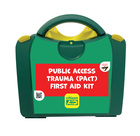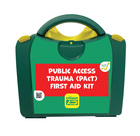Commercial Tourniquets
Unlock This Video Now for FREE
This video is normally available to paying customers.
You may unlock this video for FREE. Enter your email address for instant access AND to receive ongoing updates and special discounts related to this topic.
Guide to Commercial Tourniquets for Amputations and Severe Bleeding
Commercial tourniquets come in various designs, but all work by cutting off circulation to a limb beyond the tourniquet's application point. They are used for amputations or catastrophic bleeds when direct pressure is ineffective. Tourniquets must be applied tightly, causing discomfort. They can be found in public access bleed kits and have been successfully used in various sectors for years. The two main types are windlass tourniquets, such as the Combat Application Tourniquet (CAT), and ratchet tourniquets, like the Rapid Stop.
Combat Application Tourniquet (CAT)
- Sit the patient down and explain the process.
- Call emergency medical services if you haven't already.
- Remove the CAT tourniquet from its packaging.
- Place the tourniquet around the limb and tighten it with the windlass until the bleeding stops. Avoid applying it over a wound or joint.
- Secure the windlass in its holder and note the application time for emergency medical services.
- Monitor the patient and treat them for shock. If possible, send someone to guide the ambulance to your location.
Rapid Stop Tourniquet
- Place the Rapid Stop Tourniquet around the limb and pull it tight.
- Instead of using a windlass, tighten the tourniquet by adjusting the ratchet.
- If bleeding resumes, tighten it further. If necessary, apply a second tourniquet above the first one.
For more information on specific tourniquets or public access bleed kits, please contact us.

.png)


